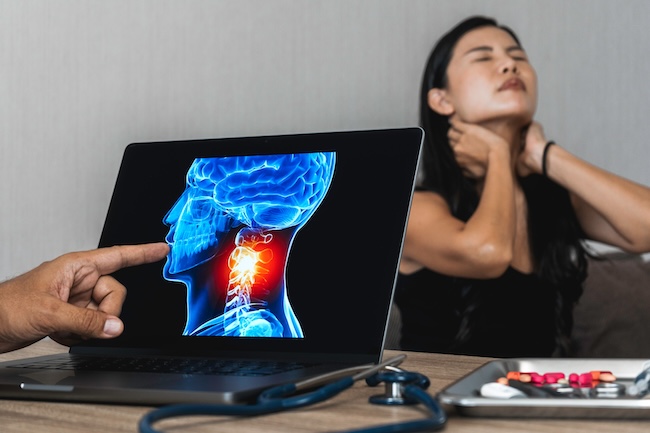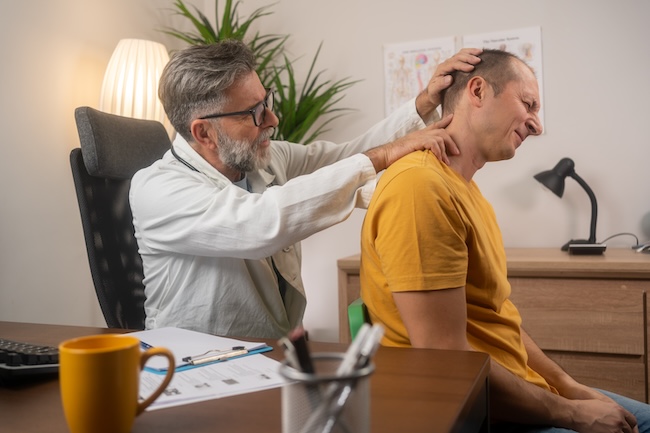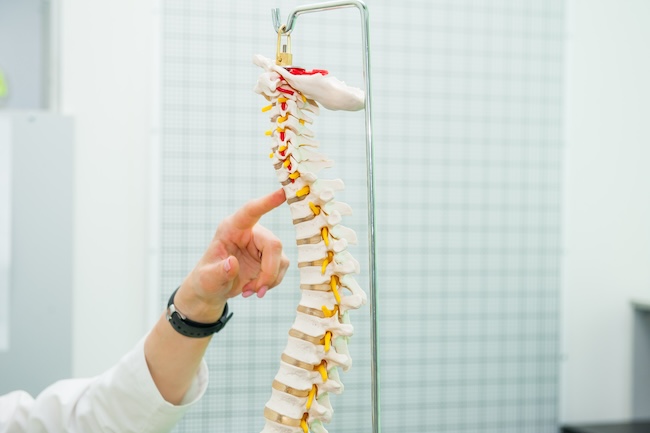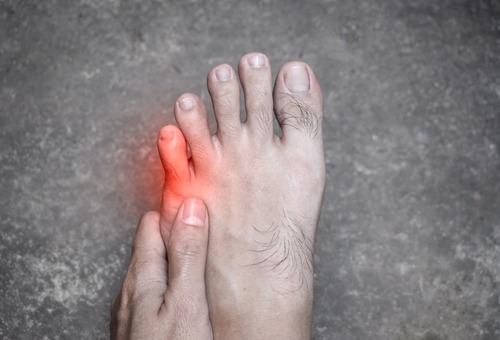How a Whiplash Injury Doctor Can Help Relieve Pain After an Accident
Whiplash injuries are a real pain. Whether it’s from a car accident, sports injury or some other trauma, neck pain and chronic pain can mess with your daily life. But help is available. Seeing a whiplash injury doctor can be the first step to getting relief.
Going to an Atlanta medical clinic is the first step to managing your symptoms and healing from your injury. In this post, we’ll show you how a whiplash injury doctor can help you with your pain and guide you through the process.
Whiplash Causes
Whiplash is a neck injury from the rapid back-and-forth movement of the head, often from various traumatic events.
In severe cases, whiplash can also impact the spinal cord, necessitating immediate medical attention to prevent further complications.
Car Accidents
The most common cause of whiplash is car accidents, especially rear-end collisions. In these accidents the head is jerked back and forth rapidly, stretching and straining the neck muscles and soft tissues. Even low-speed collisions can cause significant neck injuries, that’s why whiplash is a common complaint among accident victims. In such cases, consulting a personal injury attorney can help ensure that you receive proper compensation for your injuries, supported by comprehensive medical documentation.
Sports
Whiplash injuries can also occur during sports, especially in contact sports like football, rugby or hockey where physical contact is common. Athletes can get rapid neck movement from tackles or falls, resulting in neck strain and soft tissue damage. High-speed sports like skiing or cycling can also cause whiplash in case of sudden falls or crashes.
Physical Abuse
In cases of physical abuse or assault, a forceful impact to the neck or head can cause whiplash. Being violently shaken or punched in the face can cause the same rapid motion of the neck, resulting to muscle, tendon, and ligament injury. Domestic violence victims are at risk for whiplash injuries because of the nature of the trauma involved.
Other Traumatic Events
Any sudden trauma that involves rapid head and neck movement can cause whiplash. This includes falls, amusement park rides, or being hit by a heavy object. In these situations the neck is forced into unnatural positions, causing the soft tissues to overstretch or tear.
Whiplash Symptoms
The symptoms of whiplash can cause a variety of issues that can affect daily life. The most common complaint is neck pain. This can be mild to severe. Stiffness in the neck is also common, making it hard to turn or tilt the head. Many people experience a reduced range of motion, which is frustrating.
Other
In addition to neck pain, whiplash can cause shoulder pain and discomfort in other areas. Pain can radiate to the shoulders, upper back, arms, or even hands. Some people report dizziness or lightheadedness. Numbness or tingling in the arms or hands can also occur, indicating nerve involvement.
Other Issues
Headaches are another symptom, often from muscle tension in the neck. Fatigue can set in and people can feel drained. Sleep disturbances can occur and people can become irritable and unable to concentrate. These symptoms can affect a person’s quality of life, so if they occur after an accident or trauma, see a doctor.
Whiplash Diagnosis
Accurate diagnosis is key to proper treatment and recovery as whiplash can be tricky to diagnose.
Why Accurate Diagnosis Matters
Accurate diagnosis of whiplash injuries is important for treatment. It starts with a physical examination and a detailed medical history. During this examination, your whiplash injury doctor will check your neck’s range of motion and look for pain or discomfort. They will also ask you questions about the incident that caused the injury, including the type of accident or trauma you experienced.
Imaging Tests
Imaging tests are part of the diagnostic process. Whiplash injuries may not always show up on regular X-rays but advanced imaging tests like CT and MRI can rule out other conditions. These tests can give a clearer view of the soft tissues in the neck including muscles, disks, and nerves.
Comprehensive Whiplash Diagnosis and Treatment at Georgia Spine & Orthopedics
At Georgia Spine & Orthopedics, our experienced team specializes in diagnosing and treating whiplash injuries with a personalized approach. We know that whiplash can cause debilitating pain, restrict neck movement, and impact daily life. That’s why we offer a full spectrum of treatment options, tailored to relieve pain, support healing, and restore mobility. Here’s how Georgia Spine & Orthopedics can help you on the road to recovery.
Advanced Whiplash Diagnosis
Diagnosing whiplash accurately is essential, as symptoms can often overlap with other neck injuries. Our specialists use thorough evaluations and advanced imaging techniques to confirm the presence of whiplash and assess the severity of the injury. By accurately diagnosing the root cause of your pain, we create a targeted treatment plan that addresses your unique needs.
Painkillers for Whiplash Relief
For patients with mild to moderate whiplash pain, over-the-counter painkillers like acetaminophen can be highly effective. These medications help reduce immediate discomfort, allowing patients to engage more comfortably in physical therapy or other treatments prescribed by their whiplash doctor. Painkillers offer the flexibility of as-needed relief and can be integrated smoothly into a holistic treatment plan for whiplash.
Nonsteroidal Anti-Inflammatory Drugs (NSAIDs) to Reduce Whiplash Inflammation
NSAIDs, such as ibuprofen, are essential for reducing the inflammation that often accompanies whiplash. Inflammation in the neck and shoulder area can contribute to swelling, stiffness, and whiplash pain, making movement difficult. By prescribing NSAIDs, our whiplash doctors at Georgia Spine & Orthopedics help patients experience reduced swelling and sustained pain relief. NSAIDs are often a foundational part of a whiplash treatment plan, enabling other therapies, such as chiropractic adjustments or physical therapy, to be more effective.
Muscle Relaxants for Tension and Muscle Spasms
Muscle tension and spasms are common symptoms of whiplash and can cause significant discomfort. When the neck muscles are strained from the sudden force of a car accident or injury, spasms may occur as a protective response, which can increase whiplash pain. To ease this tension, our whiplash doctors at Georgia Spine & Orthopedics may prescribe muscle relaxants. These medications work to calm the muscles, reduce spasms, and enhance overall comfort, allowing for more freedom of movement during rehabilitation exercises.
Targeted Lidocaine Injections for Severe Whiplash Pain
In cases of severe whiplash where pain is intense and localized, targeted lidocaine injections can be particularly beneficial. Our whiplash doctors use these injections to numb specific areas, providing immediate relief and reducing the need for continuous oral medications. Lidocaine injections are ideal for patients whose whiplash pain is too intense to manage with other medications alone. By alleviating severe pain, these injections also allow patients to participate more effectively in physical therapy and other treatments designed to restore mobility and reduce overall recovery time.
Non-Medication Therapies for Whiplash at Georgia Spine & Orthopedics
At Georgia Spine & Orthopedics, we understand that whiplash requires a comprehensive approach to healing. In addition to medication-based treatments, our whiplash doctors provide a range of non-drug therapies designed to alleviate pain, reduce inflammation, and support the body’s natural healing processes. By integrating these non-medication therapies, we offer a well-rounded treatment plan that targets whiplash pain from multiple angles, promoting faster recovery and long-term well-being.
Cold and Heat Therapy for Whiplash Pain Relief
Cold and heat therapy is an effective, time-tested method for managing whiplash pain. Immediately following a whiplash injury, applying ice packs to the neck helps minimize swelling and reduce inflammation. Ice therapy is particularly beneficial in the acute phase of whiplash, as it can reduce pain and prevent further damage to surrounding tissues. Our whiplash doctors recommend applying cold packs for 15-20 minutes several times a day during the initial days following the injury.
As recovery progresses, heat therapy can be introduced to further support healing. Heat helps relax tight muscles, increase blood flow, and alleviate stiffness in the neck, which is common in whiplash patients. By alternating between cold and heat therapy, patients can experience continuous relief from whiplash pain and promote circulation, which enhances the body’s natural healing response. Our specialists at Georgia Spine & Orthopedics provide guidance on the proper application of cold and heat therapy to maximize its effectiveness and safety.
Neck Collars for Support and Stability
Soft neck collars are another non-medication treatment option that our whiplash doctors use to aid in the early stages of whiplash recovery. A soft collar provides gentle support to the neck, limiting movement and allowing injured tissues to heal without the risk of further strain. This support is particularly useful during the initial days after the injury, as it helps stabilize the neck and reduce whiplash pain by preventing excessive motion that could aggravate the injury.
While neck collars offer essential support, our whiplash doctors recommend using them only for a short period, as prolonged use can lead to muscle weakness and stiffness. At Georgia Spine & Orthopedics, we guide patients on the appropriate duration and use of neck collars to ensure they provide the maximum benefit without compromising long-term recovery. Our team monitors each patient’s progress and advises on when to transition away from the collar to maintain muscle strength and flexibility in the neck.
Guided Movement and Gentle Exercises to Restore Neck Mobility
Restoring neck mobility is crucial in whiplash recovery, as prolonged immobility can lead to stiffness, reduced range of motion, and chronic pain. Our whiplash doctors at Georgia Spine & Orthopedics incorporate guided movement exercises to encourage gentle, controlled activity in the neck. These exercises are carefully designed to prevent stiffness, maintain flexibility, and promote gradual recovery.
Our whiplash specialists work closely with each patient to demonstrate specific neck exercises that improve strength and restore function. Common exercises include gentle stretching, rotation, and lateral movement exercises that keep the neck muscles active without overloading them. Guided movement also helps prevent the development of scar tissue, which can limit flexibility if left untreated. By engaging in these exercises, patients can experience a faster recovery and reduce the likelihood of long-term whiplash pain.
Physical Therapy and Rehabilitation for Whiplash
In addition to at-home exercises, our whiplash doctors may recommend physical therapy sessions with a licensed therapist. Physical therapy is a critical component in whiplash treatment, as it addresses not only pain management but also muscle reconditioning. During physical therapy, patients engage in exercises that build strength, improve posture, and support the neck’s stability. Therapists may also use manual therapy techniques, such as myofascial release and massage, to alleviate muscle tension and enhance blood flow, both of which aid in recovery.
Manual Manipulation and Chiropractic Adjustments
For patients with spinal misalignment resulting from whiplash, chiropractic adjustments may be recommended to restore proper alignment and reduce nerve pressure. At Georgia Spine & Orthopedics, our whiplash doctors use gentle manual manipulation to relieve whiplash pain by targeting affected vertebrae and improving spinal function. Chiropractic care is especially beneficial for reducing nerve-related symptoms, such as tingling and radiating pain, that often accompany whiplash injuries.
Frequently Asked Questions About Whiplash and Car Accident Injuries at Georgia Spine & Orthopedics
What are the most common symptoms of a whiplash injury after a car accident?
Whiplash injuries can cause symptoms such as neck pain, stiffness, headaches, dizziness, and even shoulder and back pain. Some people may also experience fatigue, irritability, and difficulty concentrating. It’s important to seek medical attention as soon as possible to properly diagnose and treat these symptoms to prevent long-term issues.
How soon should I see a doctor after a car accident for a whiplash injury?
It’s best to see a whiplash doctor within 24 to 48 hours after a car accident, even if you don’t feel severe pain initially. Symptoms can sometimes take days to appear, and early evaluation can help catch any underlying issues and prevent complications.
How does a whiplash doctor diagnose a whiplash injury?
At Georgia Spine & Orthopedics, our whiplash doctors conduct a thorough evaluation that includes a physical exam and may involve imaging tests like X-rays, MRIs, or CT scans to identify any soft tissue injuries, spinal misalignment, or disc issues associated with whiplash.
What treatments are available for whiplash pain at Georgia Spine & Orthopedics?
Our treatment options for whiplash pain include medication-based management, physical therapy, chiropractic adjustments, cold and heat therapy, and massage therapy. Our doctors work with each patient to develop a personalized treatment plan to effectively relieve pain and promote healing.
Can whiplash symptoms become chronic if left untreated?
Yes, untreated whiplash can lead to chronic pain and long-term complications, including persistent neck pain, limited range of motion, headaches, and even nerve damage. Early intervention with a skilled whiplash doctor can significantly reduce the risk of chronic symptoms and improve recovery outcomes.
Do I need a referral to see a whiplash doctor at Georgia Spine & Orthopedics?
You typically don’t need a referral to schedule an appointment with a whiplash doctor at Georgia Spine & Orthopedics. Simply call our office, and we’ll help you set up a consultation with our specialized team.
How long does it take to recover from a whiplash injury?
Recovery time varies depending on the severity of the injury and the effectiveness of the treatment plan. With prompt treatment from a whiplash doctor, many patients experience significant improvement within a few weeks, although more severe cases may require months of care.
Are there non-medication options for managing whiplash pain?
Yes, Georgia Spine & Orthopedics offers non-medication therapies such as cold and heat therapy, physical therapy, chiropractic adjustments, and massage therapy to manage whiplash pain without relying on medications.
How can chiropractic adjustments help with whiplash pain?
Chiropractic adjustments help align the spine, reduce nerve pressure, and relieve pain associated with whiplash injuries. Our whiplash doctors may recommend this treatment to restore function and alleviate discomfort in the neck and upper spine.
Why should I choose Georgia Spine & Orthopedics for whiplash treatment?
At Georgia Spine & Orthopedics, our team of experienced whiplash doctors offers a comprehensive approach to healing, combining advanced diagnostics, personalized treatment plans, and compassionate care to support each patient’s recovery journey. We focus on helping you achieve pain relief, restore mobility, and prevent future complications.
Resources for Understanding and Treating Whiplash Injuries
Explore our comprehensive resources to learn more about identifying, diagnosing, and treating whiplash injuries effectively. Each article provides valuable insights and guidance on managing whiplash symptoms after a car accident.
Whiplash Injury After a Car Accident
Learn about the causes and common symptoms of whiplash resulting from car accidents, and discover why it’s essential to seek prompt medical attention. This article provides an overview of how whiplash injuries occur and the available treatment options to support recovery.
Detecting Whiplash Symptoms
Understanding the symptoms of whiplash is crucial for early diagnosis and effective treatment. This guide explains how to identify whiplash symptoms, including those that may appear days after the accident, and why early intervention with a specialist is important.
About Georgia Spine & Orthopedics: Comprehensive Care for Injury and Pain Relief
At Georgia Spine & Orthopedics, we are dedicated to providing exceptional, patient-centered care for individuals suffering from spinal injuries, chronic pain, and trauma-related conditions, including whiplash from car accidents. Our team of highly skilled doctors, therapists, and specialists has extensive experience in diagnosing and treating a wide range of musculoskeletal injuries and pain conditions, ensuring each patient receives personalized care and the highest standard of treatment.
Georgia Spine & Orthopedics is committed to a holistic approach to healing. We understand that every injury is unique, so we design individualized treatment plans that may include medication, non-drug therapies, physical rehabilitation, chiropractic adjustments, and other advanced pain management techniques. Whether you’re dealing with neck pain, back pain, or injury-related complications, our goal is to help you recover safely, reduce pain, and regain mobility.
Our state-of-the-art facilities are equipped with the latest diagnostic tools and therapeutic technologies to support accurate diagnosis and effective treatment. From your first consultation to your final follow-up, Georgia Spine & Orthopedics is here to guide you through each step of your recovery journey, empowering you to live a healthier, pain-free life.
Take the First Step Toward Recovery at Georgia Spine & Orthopedics
If you’re experiencing pain from a whiplash injury, don’t delay the care you need. At Georgia Spine & Orthopedics, our dedicated team of specialists is here to help you relieve pain, restore mobility, and reclaim your quality of life with personalized treatment plans.
Contact us today to schedule an appointment with our skilled team.
Call 678-929-4494 or visit our Atlanta clinic to begin your journey toward effective, lasting relief. Georgia Spine & Orthopedics is here to support you every step of the way.












